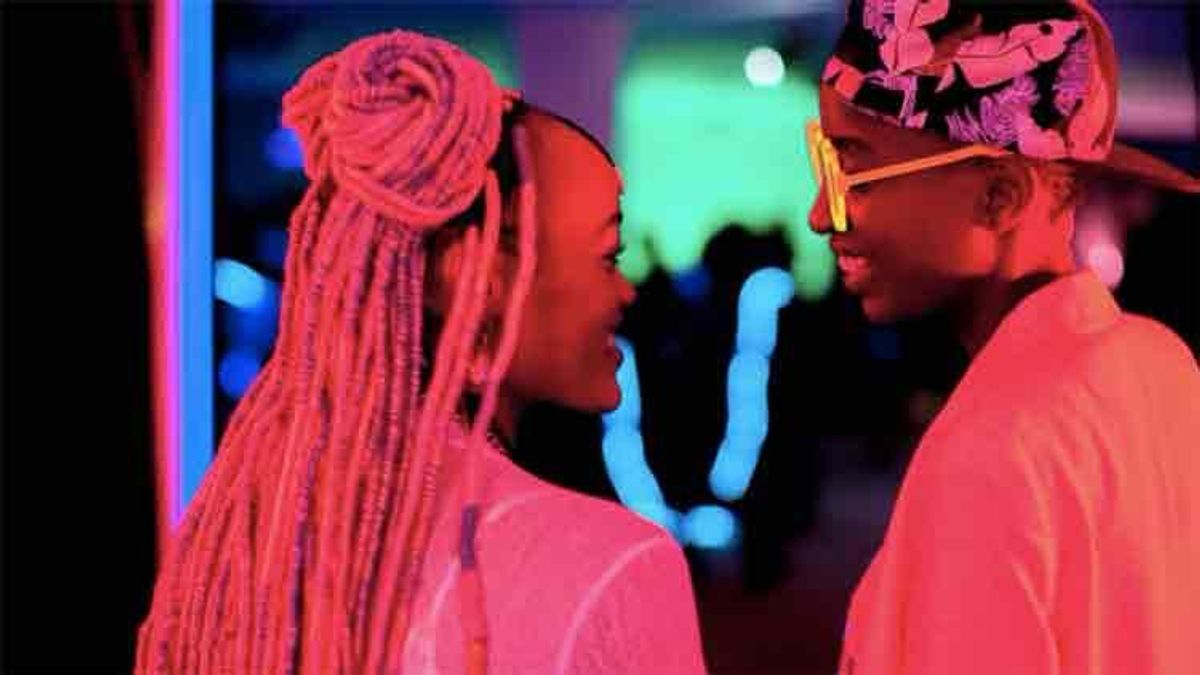Entertainment
REVIEW: Banned Lesbian Drama "Rafiki” Is Stylish, Sweet, & Courageous

“Rafiki” is an announcement of courage and talent worthy of global admiration.
November 12 2018 4:06 PM EST
May 26 2023 3:26 PM EST
By continuing to use our site, you agree to our Private Policy and Terms of Use.

“Rafiki” is an announcement of courage and talent worthy of global admiration.
Censorship seldom has the desired effect. When the Kenyan government banned "Rafiki," a very strong new lesbian drama directed by Wanuri Kahiu, they ensured the film would become an international cause celebre, as well as a hit at the domestic box office: Kenyans turned out en masse to see the controversial movie once the ban was lifted. "Rafiki" (literally "Friend") would have been an accomplished film either way, but the context of its release deepens its emotional impact. Now, it is playing to packed houses on the festival circuit and is making its LA premiere at AFI Fest.
"Rafiki" lands us in Nairobi with a lively, colorful opening credits sequence before introducing us to Kena (Samantha Mugatsia), a working class teenage girl who fits in with the boys. After school, she plays soccer and works at her father's store. Her father (Jimmy Gathu) is running for local office against a powerful incumbent whose daughter Ziki (Sheila Munyiva, excellent) is Kena's classmate. Ziki, privileged and beautiful, wears her hair in pink and purple braids and spends her afternoons dancing in the streets with her friends. They have noticed one another from afar, and their attraction is mutual. They begin to meet in secret, and we find that these two young actresses have a potent chemistry.
Kahiu does fine work setting up the social context for the girls' star-crossed love. In the first scene, one of Kena's friends aggressively bullies a local out gay boy, a silent, brooding presence who appears throughout. We are also introduced to a mother-daughter duo who trade pass along gossip and judgment from their food kiosk, a local meeting place. And then we follow everyone to the local evangelical church, where the congregants nod and applaud when the pastor condemns same-sex marriage. Ziki and Kena are well aware that's only a matter of time before the whispers start. When Ziki reaches for Kena's hand at church, Kena pulls away. She knows who will take the blame if anyone finds out. She's poorer, and her gender presentation sticks out. ("You know I'm allergic to dresses!" she says.) The town gossips already view her with suspicion, and to make matters worse, her father is the underdog candidate.
I have not seen any other movies by Wanuri Kahiu, but now I would like to. A prominent female filmmaker with her own production company, she swept the African Academy Awards with her debut feature "From A Whisper" and is on track to go global with "Rafiki." She's a natural storyteller, and the film's slight runtime of about eighty minutes is packed with moments of striking observation and specificity. The cinematography by Christopher Wessels is alive and vivid, and the performances, especially Munyivi's, are honest and direct. When Kena and Ziki face inevitable public shame and ridicule, their pain and confusion are palpable, which makes the hopeful finale all the more sweet.
Kahiu recently told the Hollywood Reporter that the Kenyan government would not have banned "Rafiki" if it was less optimistic: "If it had been a remorseful queer story, it would have been fine." To American audiences of queer movies, "Rafiki" may feel rote and conventional, even tame. But homosexuality is still outlawed in Kenya, and it's a reminder of both our privilege and the power of representation that even a movie as tender and innocuous as "Rafiki" can still strike fear in the hearts of its home country's leaders. It was recently passed over for this year's Foreign Language Oscar submissions, but something tells me its filmmaker will be just fine, because "Rafiki" is an announcement of courage and talent worthy of global admiration.
Sexy MAGA: Viral post saying Republicans 'have two daddies now' gets a rise from the right